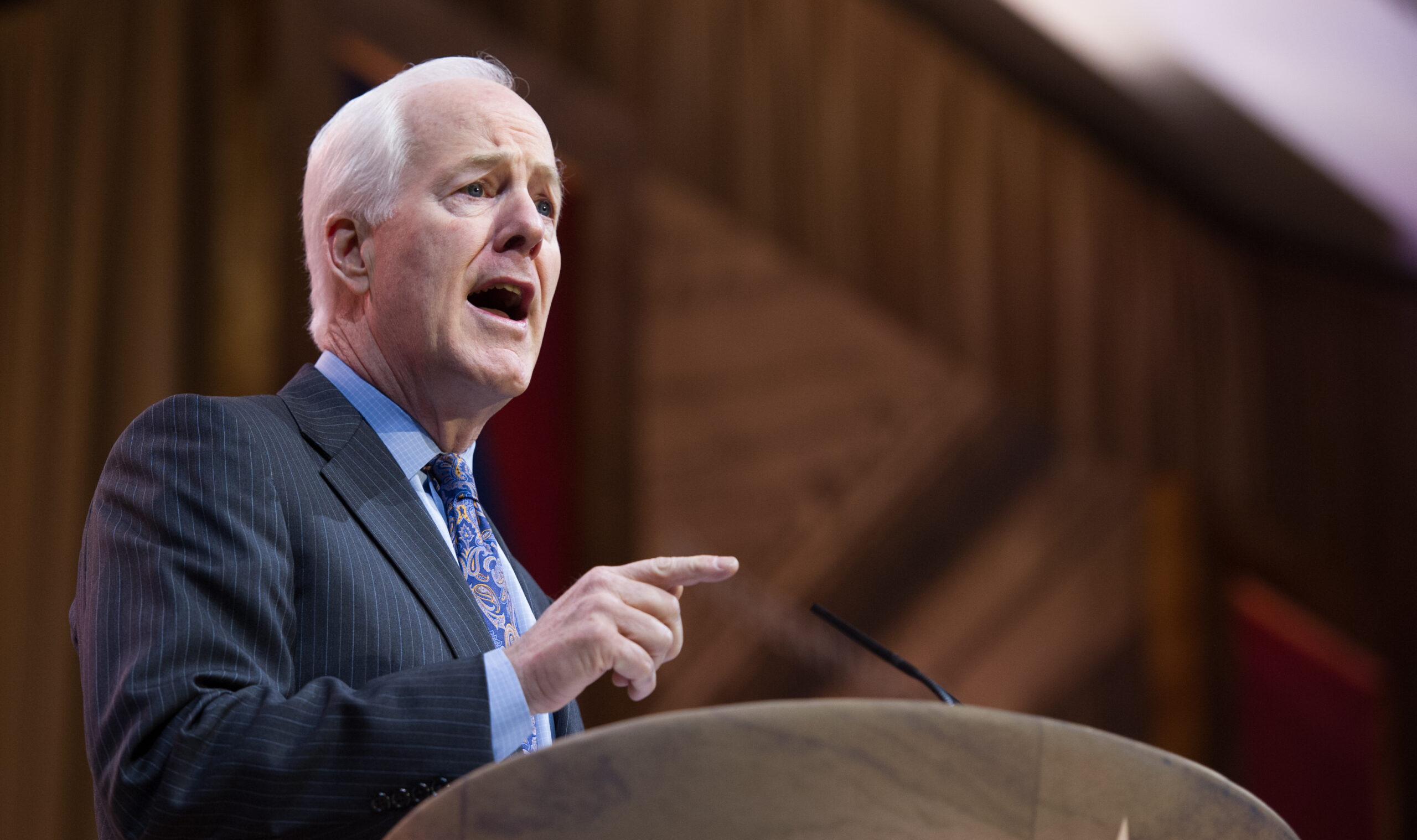Cornyn Will Undermine the Trump Agenda
The Texan is a living fossil of the Bush era.

One week ago, Donald Trump and J.D. Vance orchestrated one of the greatest comebacks in American politics, solidifying their Jacksonian moment in national history. But just as Andrew Jackson’s agenda faced relentless establishment resistance, Republicans in Congress who doubted this moment would come to fruition are already working to undermine its implications. The Senate GOP’s mantra seems to be: “The American people have made their decision—now let them enforce it.”
The chief Republican reactionary is undoubtedly Texas’s senior senator, John Cornyn. Cornyn, 72, has been a fixture in Texas politics since 1985, when he was appointed district judge in Bexar County (San Antonio). Elected to the Texas Supreme Court in 1990 and then as Texas attorney general in 1998, Cornyn rose to the U.S. Senate in 2002 as a George W. Bush ally. Since then, he has been reelected to the Senate three more times without controversy. Now Cornyn has launched his seventh campaign—this time to replace Mitch McConnell as leader of the Republican Senate Conference and Chuck Schumer as Senate majority leader.
Big John is a strong contender. An old-school Republican straight from the now largely defunct Bush wing of the Texas GOP, he represents an obvious choice if the Senate Republican Conference seeks a one-for-one replacement for McConnell. In both style and policy, Cornyn and McConnell are nearly indistinguishable; the Texan’s ascent to the leadership position would be likely to undermine the Trump-Vance mandate for populist-nationalist reform.
Central to the Trump-Vance agenda is reshaping America’s foreign policy. Exhausted by decades of fruitless wars, the American people have tasked the Trump administration with reducing their overseas commitments, from Ukraine to the Middle East. While much of this can be addressed through the presidency’s bully pulpit, reshaping the Pentagon and national security agencies along realist lines will require congressional cooperation. Here, Cornyn could prove a significant obstacle.
A staunch neoconservative, Cornyn has consistently supported American military interventions across the globe, including those in Iraq, Afghanistan, Syria, Libya, Yemen, and Ukraine, among others. Cornyn’s Bush-era belligerence has persisted, making him one of the Senate’s most ardent backers of Ukraine’s President Volodymyr Zelensky. Cornyn co-authored the Ukraine Democracy Defense Lend-Lease Act of 2022, enabling nearly $90 billion in military, economic, and humanitarian aid to Ukraine, despite longstanding concerns about corruption and misuse of funds. He also introduced the Stop Russian GOLD Act, applying secondary sanctions on entities transacting with or transporting Russian central bank gold. Cornyn has dismissed concerns over NATO expansion’s role in escalating tensions, asserting, “The United States has played no part in creating this crisis, but we have a responsibility to support the Ukrainian people as they fight to defend their sovereignty.” Efforts by the Trump administration to negotiate with Russian leadership are almost certain to face resistance—if not outright sabotage—from a Cornyn-led Senate.
Reeling from decades of neoliberal economic policies, working-class voters have issued a mandate for reshoring American manufacturing and reshaping trade agreements. Trump’s commitment to protectionism remains steadfast; in Trumpian lingo, “The word tariff... is a beautiful word.” Yet Cornyn has consistently opposed these efforts. A lifelong free-trader, Cornyn supported agreements as far back as the Central American Free Trade Agreement (CAFTA) in 2005. He criticized Trump’s first-term tariffs on Mexican imports as akin to “holding a gun to our own heads” and has continued to voice opposition to Trump’s trade policies, labeling them “problematic” as recently as this August. Cornyn’s trade rhetoric, of course, provided much-needed ammunition to the Harris-Walz campaign during a hotly contested general election.
While Trump holds considerable unilateral authority over trade policy, major agreements—such as Trump’s USMCA—require Senate approval to become permanent and enduring. Cornyn’s ideological commitments make it clear he would frustrate Trump’s trade agenda at every turn.
Paramount in Trump’s domestic agenda is controlling the unprecedented trafficking crisis at the southern border. Trump has pledged to carry out the largest deportation operation in American history and “wage war” on cartels. Cornyn, however, has a mixed record on immigration. While he has introduced border security bills and occasionally opposed amnesty, he has also supported targeted amnesty measures and criticized Trump’s zero-tolerance policies. In 2016, Cornyn trashed Trump’s proposal to build a border wall as “naive.” During the migrant surges of 2021, he supported the DREAM Act, working with a coalition of business interests reliant on trafficked labor.
The conservative Federation for American Immigration Reform (FAIR) awarded Cornyn just a 71 percent legislative rating for the 118th Congress, citing his votes against common-sense border reforms amid Texas’s border crisis. By contrast, his junior senator, Ted Cruz, earned a perfect 100 percent.
Subscribe Today
Get daily emails in your inbox
Cornyn’s opposition to the Republican Party’s new electoral mandate has prompted major Texas GOP groups to oppose his leadership bid. The Tarrant County Republican Party—representing the largest Republican county in America—joined the Dallas County GOP in passing resolutions rejecting Cornyn’s candidacy. Their statement reads:
Whereas, John Cornyn, who repeatedly has stood against Republicans and sided with the Democrats pushing omnibus bills that do not benefit Americans, is being considered as a top contender for this role.
BE IT RESOLVED that Tarrant County Republican Party rejects John Cornyn as a possible Majority Leader of the United States Senate and encourages Republican U.S. Senators to elect a majority leader that represents President Trump and the America First Agenda, such as Rick Scott or John Kennedy.
Whether the Republican Senate Conference will align with these Texas counties remains to be seen. The Conference is set to convene and vote by secret ballot for the next generation of GOP Senate leadership on Wednesday. Will the Senate heed the American people’s emphatic call for reform, or will it double down on a dying consensus? The fate of Cornyn’s leadership bid will provide the answer.